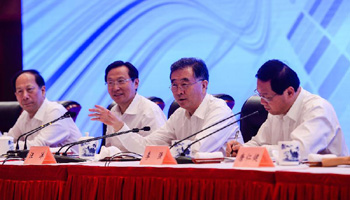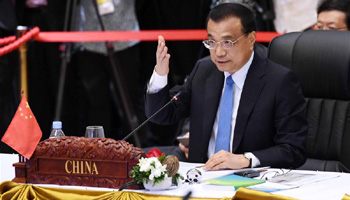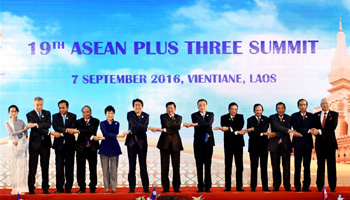
U.S. President Barack Obama (Xinhua photo)
by Xinhua writer Liu Chang
VIENTIANE, Sept. 8 (Xinhua) -- As U.S. President Barack Obama attends his last East Asia Summit here Thursday, it is high time that Washington conducted some serious soul-searching over the outgoing administration's signature pivot to Asia policy.
Unlike many of his predecessors who were inclined to take adventures in the Middle East, Obama dubbed himself the United States' first Pacific president, and has chosen to entrench and expand the U.S. presence in Asia.
Yet the past few years have repeatedly proved that his overarching strategy, later labeled the U.S. rebalance to the Asia-Pacific, is just a narrow-minded scheme orchestrated to maintain his country's hegemony and corrosive to the region's peace and stability.
It is an open secret that China -- a large country with steadily increasing national strength and international influence -- is the bull's-eye. The Obama administration has never said that, but it is trying to deploy an advanced missile defense system in South Korea that far exceeds Seoul's security needs, and its hand is behind the South China Sea arbitration farce staged by the former Philippine government.
Although some nations in the region have been hoodwinked once in a while, most others are clear-eyed. In a July meeting in the Laotian capital of Vientiane in the wake of the arbitration horseplay, Southeast Asian foreign ministers rejected anti-China incitements and called for settling maritime disputes through negotiations.
The self-command of most Asian countries is just part of the reason why Washington's enthrallment spell is losing its power. Besides that is the increasing difficulty for the United States to put the pieces together and pull off the trick.
On the one hand, the economic pillar of the policy, the Trans-Pacific Partnership (TPP), is cracking. The Obama administration will be gone in less than five months, and Hillary Clinton and Donald Trump, the White House contenders of the two major U.S. parties, are united in assaulting the deal, although they are at each other's throat.
Even if the trade pact were approved and enacted, its potential would be very much in doubt, as the largest trader in the world and largest trading partner of many countries across the region - China -- is absent from the U.S.-pushed arrangement.
On the other hand, the military pillar remains a plan. The Pentagon once publicly declared that it would transfer 60 percent of U.S. Air Force and Navy assets to the Asia-Pacific. Intentions aside, cross-the-board budget cuts and unfinished messes in the Middle East have had it mired and hamstrung.
As regards intentions, the Obama administration's calculations behind the redeployment of military resources are as clear as daylight: Washington has to continue to call the shots in the world's most economically exuberant area.
Such a hegemony-based Asia doctrine is doomed. It is incompatible with the defining features of today's world, namely peace, development and cooperation; it puts the region's bright prospects in jeopardy; and it will harm the United States' interests in the long run.
The United States is an important player and stakeholder in the Asia-Pacific, yet the region belongs to all who inhabit it, and Beijing has every right to maintain that Washington should play a constructive role in it.
If it truly wants a peaceful and prosperous Asia-Pacific, then it is time for the United States to come up with a new playbook, as well as an epitaph for the pivot policy.











